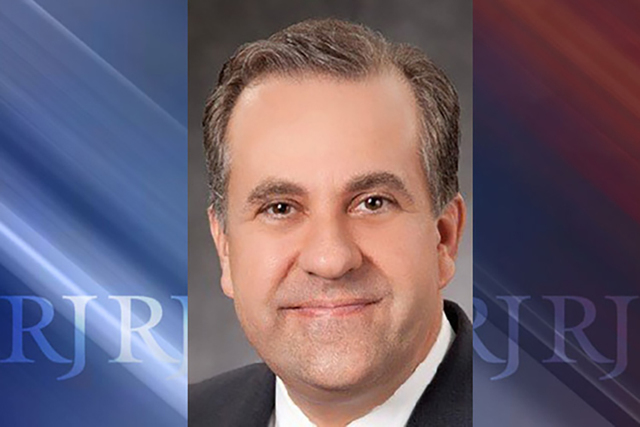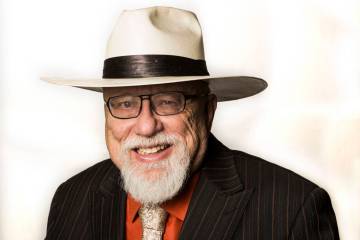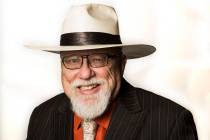Las Vegas lawyer may have put medical care for disabled and vulnerable in jeopardy
As the troubling saga of probate attorney Robert Graham plays out — the State Bar of Nevada alleges he’s stolen millions of dollars in client funds — it’s important to keep something in mind about lawyers you might find even more troubling.
Because the people who run bar associations/lawyer regulatory agencies nationwide realize theft of client property by lawyers is not an isolated problem, state bar counsel Stan Hunterton notes that pools of money are funded and maintained in every state in the union to help reimburse clients who have suffered financial losses due to thieving attorneys.
Now you might find that mechanism — called a clients’ security fund — not at all troubling, not an indictment of attorneys, but simply a necessary, realistic way of dealing with the relatively few sociopaths in suits who muck up the legal system with their absence of conscience.
Whatever you think of such a system, the monies are only parceled out to clients by a bar committee after an individual has tried all other means, such as a lawsuit, to get his money back.
In Nevada, the clients’ security fund — since 2010 its funds have ranged from $282,000 a year to $469,000 in 2014 — receives its primary revenue through a $25 assessment of each license fee received from attorneys, who renew their licenses annually. Other funding comes from fines and donations.
While Liza Dreitzer, deputy executive director of the State Bar of Nevada, said nearly $2 million has been awarded to 408 clients since 2010 — 96 attorneys were either disbarred, suspended or had been incapacitated or died in connection with those awards — she stressed that only a $50,000 maximum award can be made.
In New York state — it has 165,000 lawyers compared with Nevada’s 7,000 — more than $12 million in claims were paid out in 2015 to clients fleeced by attorneys.
Given that the Nevada State Bar says Graham’s accounting records show that he has much less than the $13 million he should have in trust funds for his clients, it’s clear the clients’ security fund could not even come close to compensating clients if the bar’s investigation is correct.
Stories filed by the Review-Journal’s Jeff German about the growing scandal can only buttress the concerns that Graham’s former clients now have regarding their financial well-being.
A weeping Graham, who refused to answer repeated questions about what happened to millions of dollars that are reportedly missing from client accounts, told German he struggled to make his failing law business work:
“I … felt I had no out …So bit by by bit, I moved the chairs on the deck … I just can’t make everything whole.”
To the state bar’s Hunterton, Graham’s words might indicate he was using trust monies for his business.
“That’s just not something you can do,” Hunterton said. “It’s like what Bernie Madoff did with his Ponzi scheme. It works until it no longer works.”
Madoff, a Wall Street financier, was sentenced in 2009 to 150 years in prison. He convinced thousands of investors to hand over their savings, falsely promising consistent profits in return.
If there was still any question about whether funds of Graham’s clients were missing, Graham answered them with this statement in a court affidavit filed this week:
“Ms. Macknin (her attorney is trying to recoup $1 million in missing funds) will not be alone in the losses.”
The more I learn about Graham, the more disgusted I become with his lack of empathy.
As both Hunterton and Brandi Cassady, one of the attorneys appointed to handle Graham’s cases, have noted, trust funds for ongoing medical care for those who need daily nursing or assisted living help have been jeopardized.
Not once has he talked about the vulnerable who depended on him to get their medical care.
Instead he talks about not having an out of his failing business, of moving chairs around on the deck.
We might find out that what Frederick Miller, the former executive director of the clients’ security fund for the state of New York, wrote in the University of Pennsylvania Law Review, could well apply to Graham:
“Typically, lawyers who steal are struggling to maintain a marginal practice. They have stolen clients’ money several times over the course of months, or even years … It is a path down a slippery slope — robbing Peter to pay Paul, and then robbing Paul and the remaining apostles.”
Paul Harasim’s column runs Sunday, Tuesday and Friday in the Nevada section and Monday in the Health section. Contact him at pharasim@reviewjournal.com or 702-387-5273. Follow @paulharasim on Twitter.






















